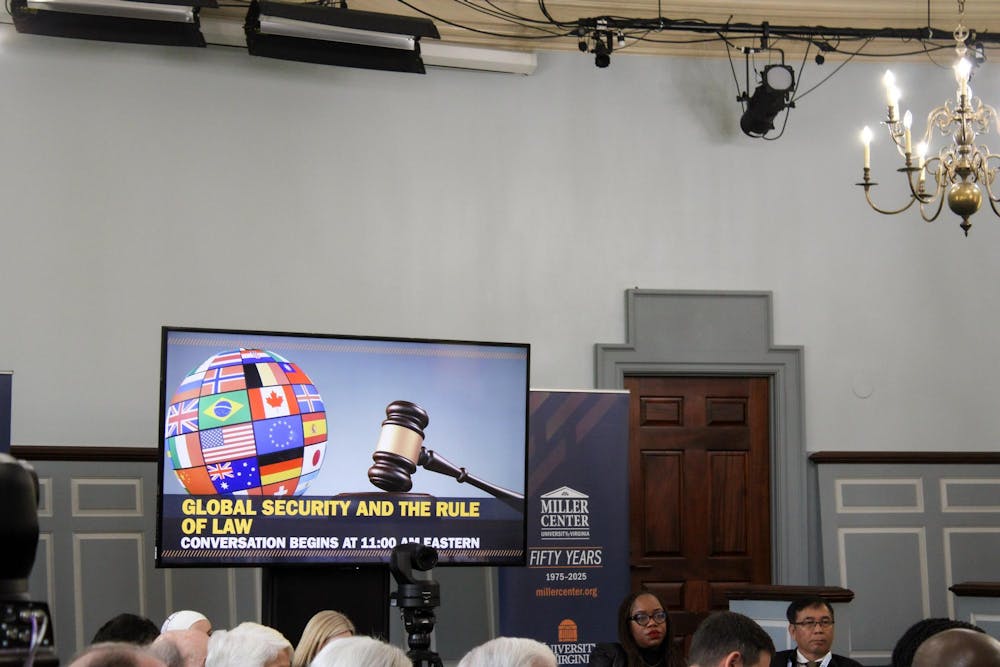The Miller Center hosted judges from Brazil, Ghana, Ukraine and the United States Friday to discuss how courts can uphold the rule of law and promote global security. Specifically, the international judges spoke about how judicial independence, legal reform and digital innovation can strengthen civic trust and ensure accountability and stability even in times of conflict.
The Miller Center is a nonpartisan affiliate of the University that aims to provide insight on public policy and political history while advancing democratic institutions. The Miller Center’s Ripples of Hope Project hosted this event alongside the Presidential Precinct and the U.S. Chamber of Commerce Foundation.
Mara Rudman, Ripples of Hope Project director and professor of practice at the Miller Center, acted as moderator for the discussion and introduced four judges from diverse legal systems, all of whom shared the same commitment to justice.
James E. Baker, former chief judge of the U.S. Court of Appeals for the Armed Forces and legal advisor to the National Security Council under former President Bill Clinton, opened the discussion by emphasizing the judiciary’s critical role in maintaining constitutional order even during crises. He claimed that the constitution should remain the controlling authority, not martial law.
Drawing from his visits to Ukraine, where he delivered lectures on armed conflict and national intelligence shortly before the Russian invasion in 2022, Baker outlined why adhering to the rule of law strengthens a nation, discussing his experiences of judicial independence under threat.
“Professional armies win wars. Armies that do not follow the law lose wars,” Baker said. “It’s an essential ingredient, following the law in a democratic army, to recruitment [of] popular and public support for the military.”
Building off of Baker’s discussion, Agnes Opoku-Barnieh, a justice of the High Court of Ghana, reflected on how legal institutions have sustained Ghana’s reputation as one of Africa’s stable democracies in the midst of an unstable region.
Opoku-Barnieh discussed how Ghana has made efforts to prevent and combat corruption, describing its implementation of an Anti-Corruption Action Plan, a national policy designed to promote accountability and transparency across public institutions in Ghana. She further claimed that Ghana’s issues concern the effectiveness of the law and whether it addresses corruption. To maintain public trust and national peace, this means ensuring that Ghana’s judiciary remains independent and fairly adheres to the rule of law.
“Ghana has been hailed as a beacon of democracy and the most peaceful country in Africa. It’s all because of the rule of law,” Opoku-Barnieh said. “In the midst of instability in the region, Ghana has remained stable because of an independent judiciary — courts that are willing to check executive expertise and the activity of … arbitrary arrest.”
On the topic of preventing instability within the state, Yegor Krasnov, judge on the Supreme Court of Ukraine, described the reality of upholding justice in a nation under siege. Krasnov said that, as of Friday, the capital city of Kiev was without electricity or water. Still, its courts continue to operate. Krasnov also touched on how Ukraine’s legal system has adapted through digital innovation to maintain order even in times of conflict.
“According to our Constitution, the rights to judicial protection cannot be limited, even during martial law,” Krasnov said. “Generators help us a lot [and citizens] can send documents [by] email … it’s like a tool, but the final decision is always on the side of cyber security.”
As the discussion drew to a close, audience members were given the opportunity to ask questions. One question came from a judge from Tanzania who, building off of Krasnov’s discussion, shared her country’s experience with court digitalization.
“In Tanzania, just like Ukraine, we have implemented the electronic management court system as part of the reforms to fight corruption,” she said. “Digitizing courts has helped us [minimize] human interaction and … corrupt practices involved in manual or paper-based court processes.”
Despite these improvements, she explained that Tanzania still faces significant barriers, including unstable electricity and cybersecurity risks. She discussed her experience with a virtual court hearing where the power went off, and she had to rush home to avoid adjourning the case. She then asked Krasnov how Ukraine deals with cyber attacks.
Krasnov explained how the Ukrainian courts are constant targets of cyber attacks, and elaborated on the country’s digitalization initiative. The initiative, led by its Ministry of Digitalization, has become a cornerstone of its judicial independence in preventing corruption, Krasnov said. Judges are able to access electronic case files and receive information from the state virtually, even amid conflict with Russia.
Krasnov explained that digitization remains an important part of the judiciary, but that maintaining secure and reliable access during conflict continues to be a challenge.
The Miller Center’s upcoming October events can be found on their website, as well as the full-length recording of this event.







